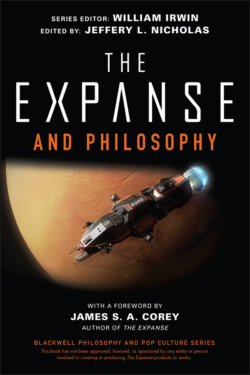Читать книгу The Expanse and Philosophy - Группа авторов - Страница 12
Оглавление
Introduction
Jeffery L. Nicholas
“I am that book!”
So declared Leviathan Wakes in 2011 when James S. A. Corey published it. And, to quote Chrisjen Avasarala, they weren’t bullshitting. The Expanse series is a phenomenal science fiction read that delves into the greatest questions of human life, a part of the “literature of progress” that challenges our everyday world by thrusting human life out to Mars, the outer planets, and worlds beyond the Ring Gates.
And when The Expanse premiered on the SyFy channel, it declared with equal strength: “I am that show!” You know the one, the one we’ve been searching for that is better than any other sci‐fi series out there. The Expanse TV series has wonderful characters, cast, and filming, and dialogue that pulls us in and doesn’t let go.
The TV series is particularly phenomenal for me. See, I suffer from aphantasia—pictures don’t populate my brain like they do most people, and it’s not from some transcranial magnetic stimulation. I feel empathy just fine, and when reading books, I lose myself in the characters. But I don’t see the Roci searching the stars for a safe harbor or picture Jules‐Pierre Mao kneeling at the feet of Avasarala. Watching the Rocinante on screen, seeing the torture that Naomi goes through to save people’s lives, only makes me love the books and the characters more.
You are here, reading this book, because you love the books, the series, or both. And we too, the authors of the chapters you hold in your hands like Joe Miller holds Julie’s necklace, we love The Expanse. These chapters sing our love to you. They sail through this shared world, both books and TV series. We look at the challenges of flying our Epstein drive into space, explore the challenges of populating different worlds around Sol and out beyond the Ring Gate. Like Avasarala we interrogate our characters: Miller, Holden, Amos, Bobbie, Naomi, and, of course, Avasarala herself. I’ve seen online people wondering who would win a fight, Amos or Bobbie, but we’re interested in who’s more evil, Amos or Avasarala, and who might be good, Naomi or maybe Holden? We examine the costs of interstellar migration and wonder if it’s worth the cost or whether we even have a choice.
The chapters in this book cover the first five seasons of The Expanse TV series, with hints and suggestions of what we might expect in the sixth by looking at Babylon’s Ashes. We offer these to you so we can enjoy the books and TV series even more.
Taki taki. Yam seng!
